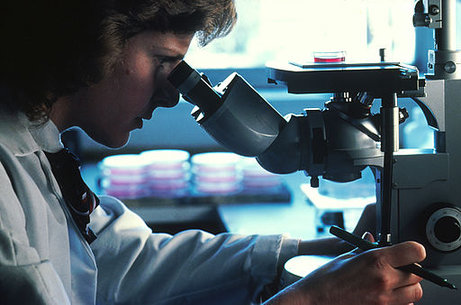
Lauren Zeitels talks about her plans to bring insights from the hospital to the laboratory and how the two can be mutually beneficial.
Lauren Zeitels has very personal reasons for trying to bridge the gap between medicine and research. Her grandmother developed dementia when she was younger. As an undergraduate in a laboratory studying neurodegenerative diseases she found that her fellow bench scientists often never had any direct experience with the human aspects of disease. “There was no connection between the proteins they were studying in the lab and how the disease was manifesting itself in humans, but it was very real to me,” she says.
Lauren [2006], who will complete an MD/PhD this spring, adds: “It was clear to me that there was not much medical professionals could offer since there were no treatments to modify the disease course. I found this very frustrating and that is why I wanted to do both research and medicine to connect the basic science and the diseases themselves. You can learn a lot from seeing how disease manifests itself in patients, bring those observations back into the laboratory and use them to identify and understand which pathways are being affected.”
Lauren has just completed her PhD, which builds on her work at the University of Cambridge where she did an MPhil in Medical Genetics in 2006/7. As she moves forward in her career, she hopes to work with patients who have genetic diseases and model these diseases in animals in an attempt to understand and eventually develop treatments targeting the affected pathways.
For her MPhil she researched the genes that increase people’s risk of developing type 1 diabetes. Her time in the lab demonstrated the intersection between biostatistics and functional genetic studies in teasing out the contribution of genetics to disease. Her PhD in Human Genetics at Johns Hopkins School of Medicine focuses on the role of miR-26, a small non-coding RNA that is involved in regulating gene expression in colorectal cancer. Her research will be published in the December edition of Genes and Development.
Childhood
Lauren, who was born in Michigan, but grew up in Pennsylvania and New Jersey, had a strong interest in science from an early age. Her father is a plastic surgeon and her mother is a pharmacist at a university hospital. While at high school she travelled to Israel as part of a science competition and did a summer research programme at Rutgers University sequencing and comparing the genes of apes and humans. It was at the time that the National Institutes of Health and Celera were racing to sequence the human genome race and Lauren became fascinated by the discussions around the implications of genetic research. She had the opportunity to further study and debate the political implications of scientific advancements at the New Jersey Governor’s School summer programme in international relations.
Despite her exposure to medicine at a young age, it was not until she started university that she decided she wanted to pursue both medicine and basic science. She attended the nearby University of Pennsylvania where she was on the Roy and Diana Vagelos Scholars Programme in Molecular Life Sciences which was research intensive and involved two summers doing independent research. While she earned a BA in biochemistry and a masters in chemistry, her interests shifted more towards genetics.
During her final year at Penn she applied to study for an MPhil in Medical Genetics at Cambridge. She was particularly interested in the Gates Cambridge Scholarship as, despite developing an interest in other countries and cultures through travel at a young age, she had not had the opportunity to study abroad. Her advisor’s experience as a post-doc in Germany as well as her cousin’s at Cambridge as a member of the inaugural Gates class further solidified her interest.
Gates
She arrived early in the summer of 2006, having deferred her MD/PhD for a year, and started work in the laboratory of Professor John Todd immediately. Her laboratory took part in one of the first genome-wide association studies as a collaboration with the Wellcome Trust. The completion of this study signaled a shift in the lab as it identified contributions from regions of the genome not previously thought to play any role in diabetes. “It was a very exciting time,” she says.
After leaving Cambridge, Lauren has become very involved with the Gates Cambridge Alumni Association. She served two terms as Secretary and is currently the Director of Operations. She says the experience of being a Gates Cambridge Scholar was “very special” and that she was continually inspired by being with such “an amazingly diverse and talented group of people”.
She has carried with her the Gates focus on improving the life of others and when she started at medical school she started working with a Baltimore-based mentoring programme called Thread which creates a family of volunteers, providing everything from tutoring to financial aid, summer jobs and furniture donations for underprivileged high school and college students. She has worked with several students, including one who will graduate from college next May. “I met him as a sophomore in high school,” says Lauren, “and have seen him grow, develop and mature. It has been really rewarding and has taught me a lot about life.”
Picture credit: Wiki Commons and National Cancer Institute..












